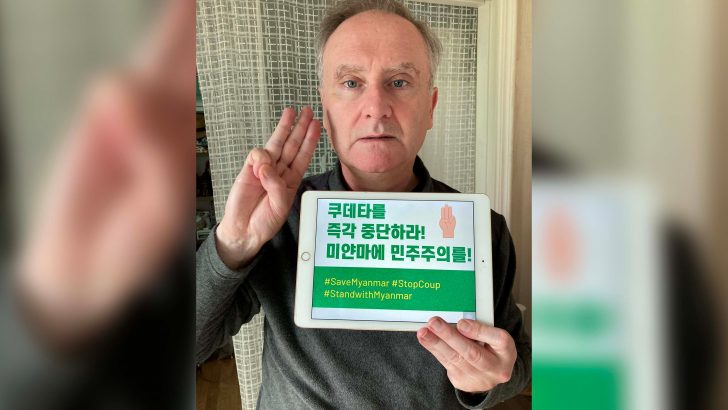Personal Profile
Fr Patrick Cunningham is the Justice, Peace and Integrity of Creation (JPIC) Co-ordinator for the Columban missionaries in South Korea. The role combines a number of his passions, particularly bettering the lot of the poor and migrants, with his calling as a missionary priest.
Their human interest stories made a deep impression on me and what their work involved when they went to work overseas”
Fr Cunningham was born and raised in a traditional Catholic family, and benefitted from an education which involved the local priests of Mullingar. It was in secondary school that his desire to become a priest was cemented, specifically as a missionary.
“I was educated in St Finian’s college Mullingar which was run by the diocesan priests back in the day,” Fr Cunningham tells The Irish Catholic. “I come from a strong, traditional Catholic household and I always harboured ambition, mostly to go overseas as a missionary, to go over as an ordained priest to devote my life with people wherever I was called or sent.
“I saw a lot of the good the priests and clergy did, I was educated by priests in Mullingar and I got inspiration from some of them. And people who would come to give us vocation talks, the St Patrick’s Missionaries Kiltegan, the Columbans from Dalgan Park. Their human interest stories made a deep impression on me and what their work involved when they went to work overseas. I was inspired by their experiences and took the plunge.”
Fr Cunningham spent a year and half, prior to his ordination in 1995, studying in South Korea. It wasn’t his first choice, he admits.
“As a student, there were three countries that came up for me to go overseas,” he explains. “It was Brazil, Japan and Korea. I wanted to go to Brazil initially because of my love of soccer and because the language would be a lot easier initially. Portuguese would be a lot easier than Korean.”
Fr Cunningham laughs when I ask if his grasp of the language has improved in his 25 years living there.
“Well, 25 years on, my Korean – I’m not too bad, not very fluent by any means. It’s a language that’s quite tough for Westerners. But on arrival here I had a good run at the language for a year in Sogang, a Jesuit university here.”
After that, it was straight into the ‘real world’. Fr Cunningham spent a year and a half in a local parish and after that moved into a ministry which was his passion – ministering to the migrant community.
There’s a sense that migrants have been blamed or accused of not taking the necessary precautions, not understanding the living conditions they have been forced into”
“After that I spent about 10 years working with migrants in Korea,” Fr Cunningham says. “Early on, as a student, I knew that working with migrants was an area that I was very interested in. We established a migrant centre in 2000 in a diocese north of Seoul. I still have a regular, ongoing Mass for a Filipino community, that’s my only connection with migrants at the moment.
“In terms of working with migrants, migrant workers particularly, we engaged with the three d’s – dirty, difficult and dangerous labour – and the injustices that they’ve had to suffer over the years in order to achieve their rights. We worked to improve their lot, their working conditions and safety in the work places.
“Those issues are still ongoing. It’s been particularly highlighted in the pandemic. The living quarters that the migrants live in are very poor, some in containers with people all in the one room. There’s a sense that migrants have been blamed or accused of not taking the necessary precautions, not understanding the living conditions they have been forced into.”
In 2006, Fr Cunningham returned to Ireland for over a year in order to complete a masters in International Peace studies at the Irish School of Ecumenics, which is now part of Trinity College. It was a combination of his study of the peace movement’s history in Korea and his background as an activist that led Fr Cunningham to be appointed to the role of JPIC Co-ordinator.
He has become a staunch support of peace movements and opponent of military expansion within Korea: “Young people are obliged to do military service,” he says. “It’s a very military country, it’s a divided peninsula and we’re still under armistice, the Korean Armistice Agreement which was signed 27 July 1953. We’re still officially at war with North Korea, no official peace treaty has been signed.
“When the armistice was signed in July 53, as part of the agreement, the parties agreed that a peace treaty would be signed within six months. Here we are 80 years on and there’s been no peace treaty. That’s a sadness given the system of division here in the peninsula.”
But Fr Cunningham, buoyed by the active social role the Church plays in Korea, remains confident.
“We’re small in number, five and a half million out of a population of 50 million,” he says. “But in terms of its role in the democracy movement over the years, in the struggle of justice and peace for many communities – it has played quite an important role. It has quite a strong social position.”


 Ruadhán Jones
Ruadhán Jones Fr Patrick Cunningham,
Columban missionary in South Korea, is
photographed
standing in solidarity with the protestors in
Myanmar
Fr Patrick Cunningham,
Columban missionary in South Korea, is
photographed
standing in solidarity with the protestors in
Myanmar 